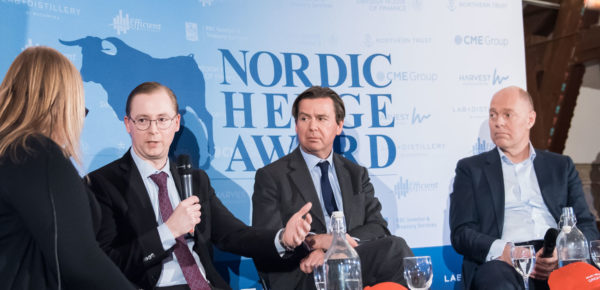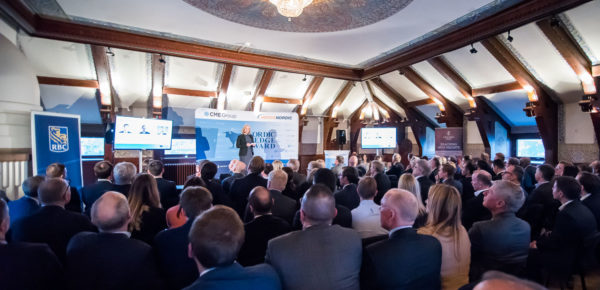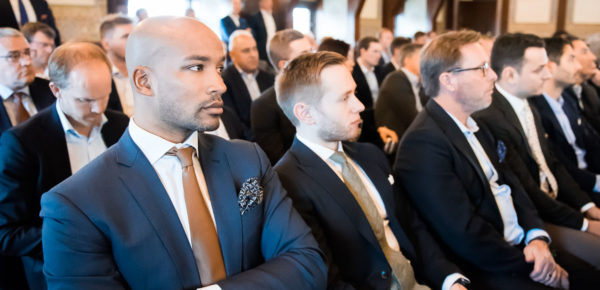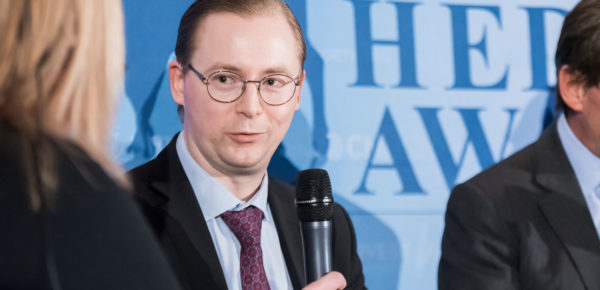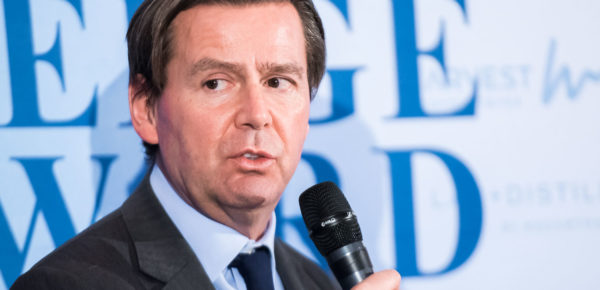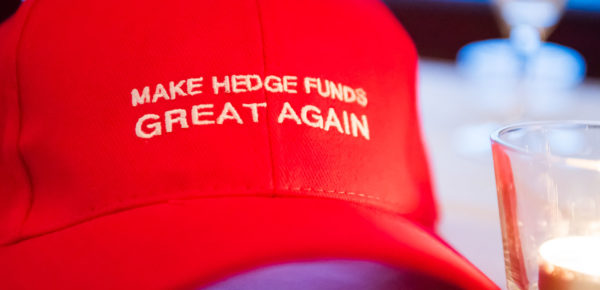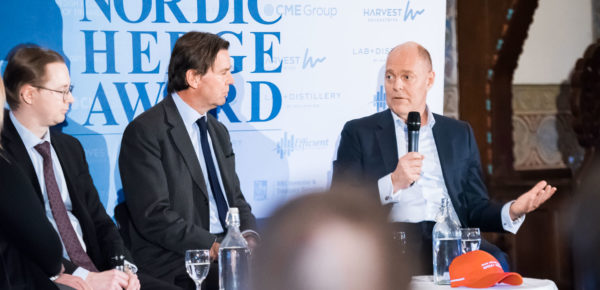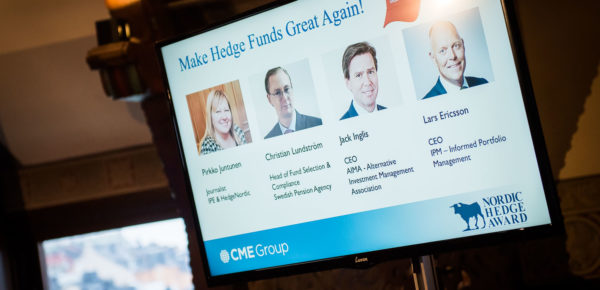Stockholm (HedgeNordic) – As is tradition, the Nordic Hedge Award ceremony started off with a panel discussion. 2018 was a challenging year to navigate for hedge funds, with some managers having proved themselves in a challenging market environment and others struggling to mitigate risk and losses. As, on the surface, hedge funds may not have done particularly well for investors in recent years, the panel discussion at this year’s Nordic Hedge Award was questioned on “how to make hedge funds again.”
Together, CME Group and HedgeNordic had invited as panellists Jack Inglis, CEO of the Alternative Investment Management Association (AIMA), Lars Ericsson, CEO of IPM Informed Portfolio Management and Christian Lundström, Head of Fund Selection and Compliance Unit at the Swedish Pensions Agency. The panel discussion was moderated by Pirkko Juntunen, a freelance journalist and writer who has been working with HedgeNordic for eight years.
Hedge Funds Aren’t as Bad as They Appear
2018 was a hard year for Nordic hedge funds as well as their global peers across a wide range of strategies. Jack Inglis, however, who has been involved with hedge funds for 30 years, reckoned there “is not as bad a picture as sometimes put forward in the media” where we often hear that “there was a massive collapse in faith and confidence in the hedge fund industry.”
Many hedge funds did find last year’s market environment difficult to navigate, with long-biased long/short funds suffering the most. But equally important, many funds did quite well, said Inglis. At the EuroHedge Awards in late January, an event celebrating the top performers of the industry, he noticed that “the average return of all the winners on the night across all different strategies was around 15 percent net of fees. That’s what I call alpha. There are managers who are consistent not just for a single year, but over the long term.”
IPM’s Ericsson, meanwhile, considered that “on average, investors are right to say that last year’s performance was disappointing, but over the medium term, investors should be reasonably happy.” 2018 “was difficult not only for equity markets but for hedge funds as a whole. These new risk premia products also had a very tough year,” said Ericsson. Whereas hedge funds might not have lived up to expectations, he acknowledged that “where the industry can do better is to understand what investors want from us.”
According to the CEO of what is now the largest single-manager fund in the Nordic region by assets under management, hedge funds act as “diversification to the dominant risk in investors’ portfolios, the equity market risk.” Ericsson has observed increased investor appetite for diversifying products in recent years. “In the past two years, investors have really started to seek for idiosyncratic or other diversifying types of products but also more generic risk premia. Anyone with a diversified hedge fund product should be able to look forward with confidence when it comes to asset gathering.”
Christian Lundström agreed, “hedge funds are not as bad as they seem, but they are falling out of favor with the media, and the reason is kind of intuitive.” Lundström pointed out two main reasons hedge funds are under fire. “An institutional investor looking at the stock market and hedge funds as two allocation options, which broadly have the same goal, may find hedge funds not very appealing” after the prolonged bullish period in equity markets.
“The current macroeconomic scenario characterized by unprecedented quantitative easing created a bull market in equities without any real drawdowns; in that climate, it is hard for hedge funds to thrive except certain strategies,” said Lundström. But he reckoned “that this environment is not sustainable over the long term, and hedge funds will be back up again in the next downturn.”
What Should Hedge Funds Do to Increase Appetite?
Lundström, who is responsible for fund selection and due diligence at Sweden’s premium pension platform – the third largest fund platform in the world, considers that hedge funds need to work harder to become more accessible. “The value for hedge funds lies in diversification,” reckoned Lundström. “Instead of committing time and money to become best-in-class, for instance, perhaps hedge funds should put more effort into increasing accessibility by becoming more liquid and increasing awareness.”
Although many Swedish retail investors may not know what hedge funds are, Lundström believes Swedes would benefit from getting exposure to this asset class. “Swedes are invested in stocks too much and can benefit from being more diversified,” he argued. “One idea is to create an all-weather product, which would combine hedge fund strategies with long-only products. In this way, hedge funds can reach a greater societal value than they offer right now.”
IPM has been very successful in attracting assets, with its Systematic Macro strategy managing around $5.4 billion, and Ericsson shared some insights explaining his firm’s success. “There are many ways to run a hedge fund,” Ericsson told the audience at the Nordic Hedge Award, but “we set out to be a diversifier from the outset since starting almost 20 years ago.” The Stockholm-based systematic asset manager focuses on large institutional investors who already have equity exposure and seek diversification.
Closing the gap between investors’ expectations and hedge fund managers’ promises is essential to achieve success in attracting assets, argued Ericsson. “We are a systematic macro manager and not a CTA, and we aim to diversify against exposures to equities and CTAs,” said Ericsson. “Our investors should not expect us to perform exceptionally well in very strong bull markets, but we expect to perform when there are hiccups and turning points in financial markets similar to the ones experienced in February or December of last year.” The key to success, therefore, lies in identifying the source of value a hedge fund product offers and, equally important, “deliver on your promises.”
Common Features of Successful Hedge Funds in the World
Jack Inglis offered a global perspective on what successful hedge funds share in common and dismissed the myth of hedge funds being a homogenous group. “One thing that always troubles me is when people talk about hedge funds as just one homogenous herd,” Inglis told the audience. Investors face so much choice in terms of strategy, managers, regions, etc. “I find it not totally helpful to think about hedge funds as one large group,” said Inglis, arguing that the industry is all about differentiation.
Successful hedge funds “differentiate themselves by their smartness,” Inglis put forward one common characteristic of successful hedge funds making a parallel with our school years. “We were all at school, and in the classroom, some people are smarter than others; and there are very smart hedge fund managers out there; they are the ones who appear to be doing very well,” Inglis said. Second and equally important, the availability of a niche strategy is what differentiates successful hedge funds from the rest.
Gone are the days when funds managers could charge high fees for running index-hugging strategies, argued Inglis. “What is becoming very clear is that hedge funds can no longer get away by providing mainly market beta returns because of the sophistication of today’s investors, with their ability to deconstruct the returns and understand how much is alpha and how much is beta,” said Inglis. “Really what investors want is the delivery of alpha, not beta disguised as alpha.”

